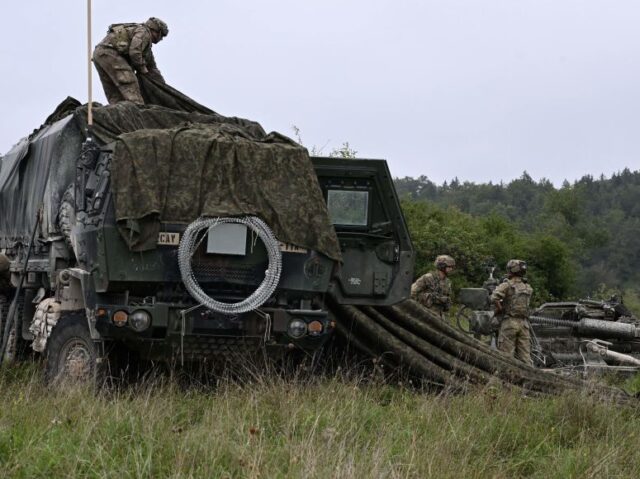The West is no longer post-Cold War and is in a new “pre-war” era with limited time left to prepare for and deter future conflicts, the UK government warns in a landmark speech on a “much more troubled world”.
China is watching Western resolve in Ukraine to see whether it loses patience with funding the Kyiv government and its defence, the UK says in an apparent call-to-arms to NATO allies to be ready for a major war on multiple fronts in the near future.
Speaking at Lancaster House on Monday, British Minister of Defence Grant Shapps said the West is facing a “much more troubled world” and could no longer consider itself post-war, with considerable new investment in military spending needed. He said:
…now is the time for all allies and democratic nations across the world to… make sure their defence spending is growing too. Because as discussed, the era of the peace dividend is over. In five years time we could be looking at multiple theatres including Russia, China, Iran, and North Korea.
…we find ourselves at the dawn of this new era. [The] Berlin Wall a distant memory but we have come full circle, moving from a post-war to a pre-war world. An age of idealism has been replaced by a period of hard-headed realism.
Illustrating actions taken by Britain to prepare itself for this multifaceted conflict the British government apparently believes is coming, Shapps cited the UK’s support to Ukraine, the country leading the largest NATO deployment since the end of the Cold War this year, the signing of a new UK-Japan-Italy fighter coalition, and the creation of the Australia-UK-U.S. submarine coalition. He said the government was moving to putting 2.5 per cent of GDP into defence spending as soon as it could afford to.
On the short term, Shapps said the West “must not” let down Ukraine, as doing so would reward Putin’s invasion with victory and send a of weakness signal worldwide. One such potential adversary looking for such signs is Beijing, he said, remarking: “China is assessing whether the West loses its patience.”
Shapp’s warning of a coming world war and a “new era” echo other very similar remarks rapidly coming from a variety of European nations in recent days. Estonia, one of Ukraine’s most enthusiastic allies and a state which has a land border with Russia said through their Prime Minister on Monday that their intelligence states NATO has “three to five years” to prepare for a Russian attack on NATO itself. Sweden warned its citizens last week to be prepared for war.
Germany is reportedly of the same mind, with the best-selling newspaper in Europe Bild splashing this week on leaked war plans anticipating Russian invasions of European states by the summer of 2025. The plans allegedly sketched out a “path to conflict” including a renewed Russian push to capture Kyiv and attempt to manufacture border crises with the Baltic states while the United States is occupied with the aftermath of the 2024 Presidential Election.
Shapps’ comments about the end of the peace dividend and the emergence of Europe into a “pre-war” era echo comments made by defence thinkers in Poland, one of the NATO states most exposed to Russian expansionism, assuming Putin “empire” building fears come true. As reported in December, Professor Katarzyna Pisarska of the Warsaw Security Forum warned “this lifestyle, the focus on the welfare state, on prosperity under the American protective umbrella” is now “over” and Europe is “entering an era of wars”.
The Warsaw Security Forum Professor Pisarska leads has previously hosted reflections on the end of the so-called peace dividend enjoyed by NATO nations at the end of the Cold War, when huge resources dedicated to maintaining nuclear weapons, large standing armies, air forces, and fleets was released to civilian purposes as those forces were scaled back. But, as said by the UK’s Armed Forces Minister James Heappey said in October, now the West is supplying the shell-hungry Ukraine war, the low-capacity peacetime defence industry was unable to keep up.
Speaking at the same session, Admiral Rob Bauer, the chairman of NATO’s Military Committee said: “we need the industry to ramp up the production at a much higher tempo. We need large volumes. The just-in-time, just-enough economy that we built together in our liberal economies for 30 years is fine for a lot of things, but not for the armed forces when there is a war ongoing.”
The head of Poland’s National Security Bureau Jacek Siewiera also spoke on these themes last year, saying earlier assessments that Europe had as much as a decade to prepare to deter Russia from further aggression were hopelessly optimistic. Siewiera said Russia, which has surprised Western observers in its ability to resupply its armed forces despite sanctions would be able to regenerate fighting capability within three years.
He said that: “To avoid war with Russia, countries on [NATO’s] eastern flank should adopt a 3-year time horizon to prepare for confrontation.”

COMMENTS
Please let us know if you're having issues with commenting.